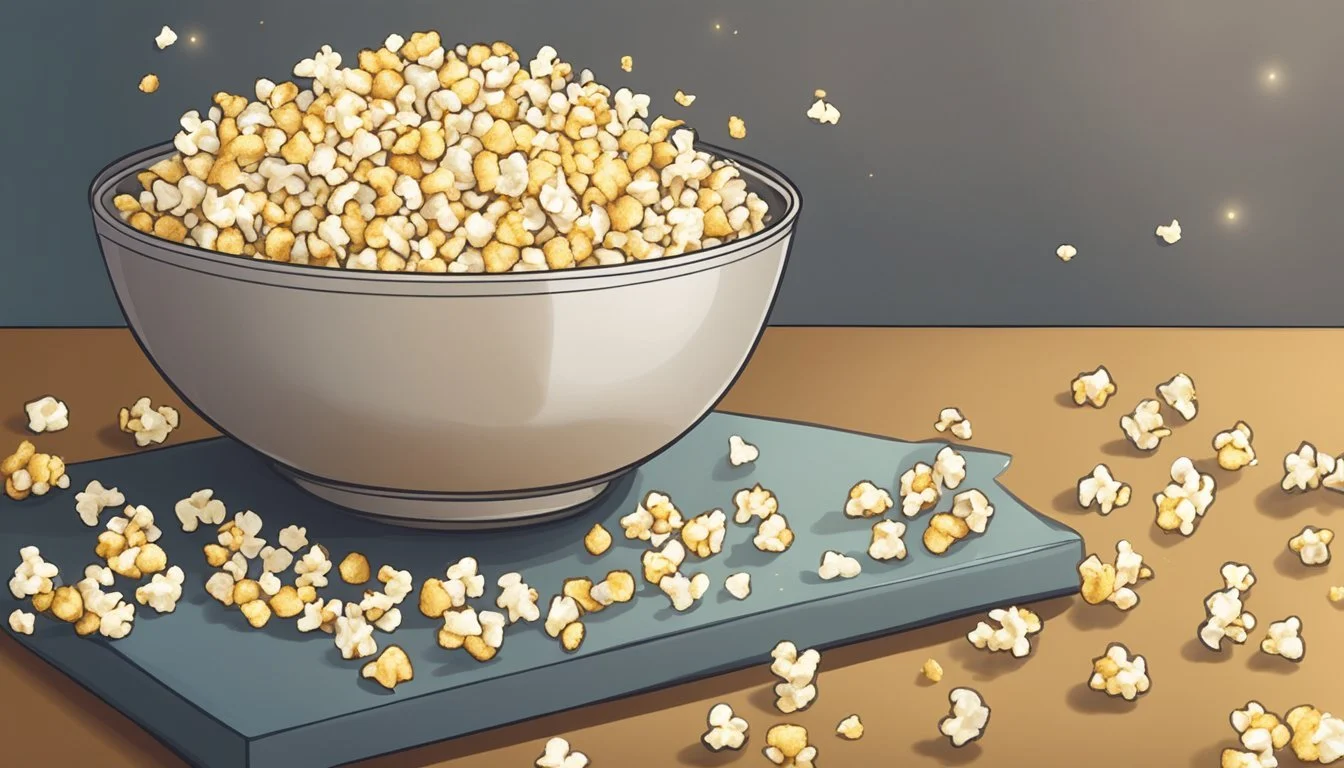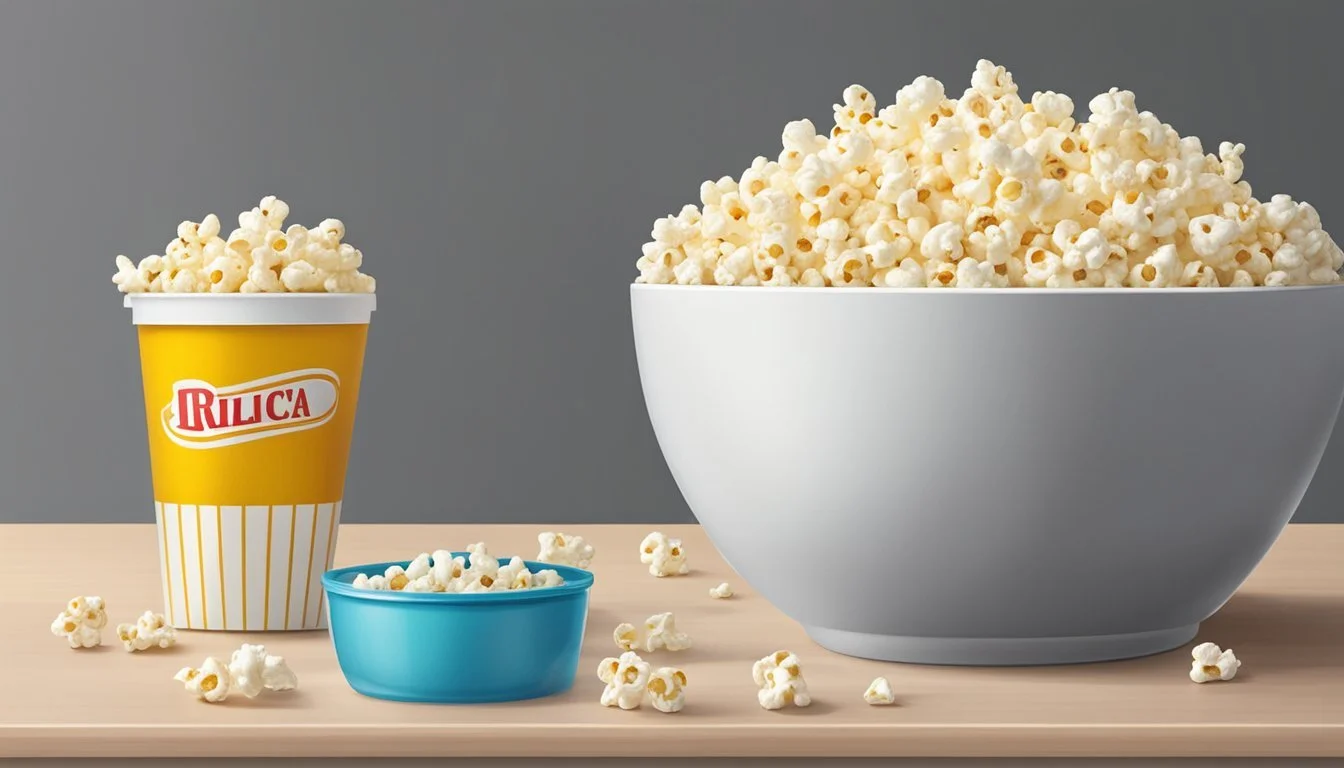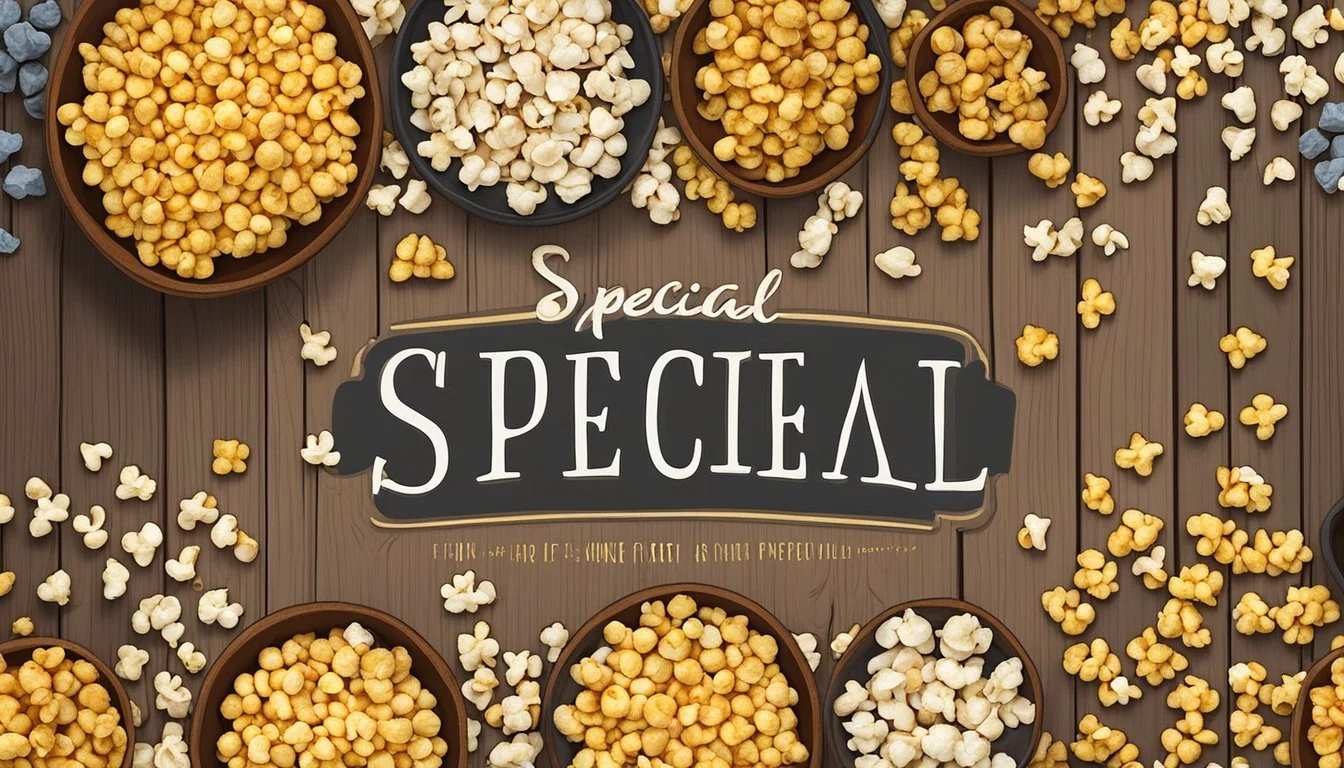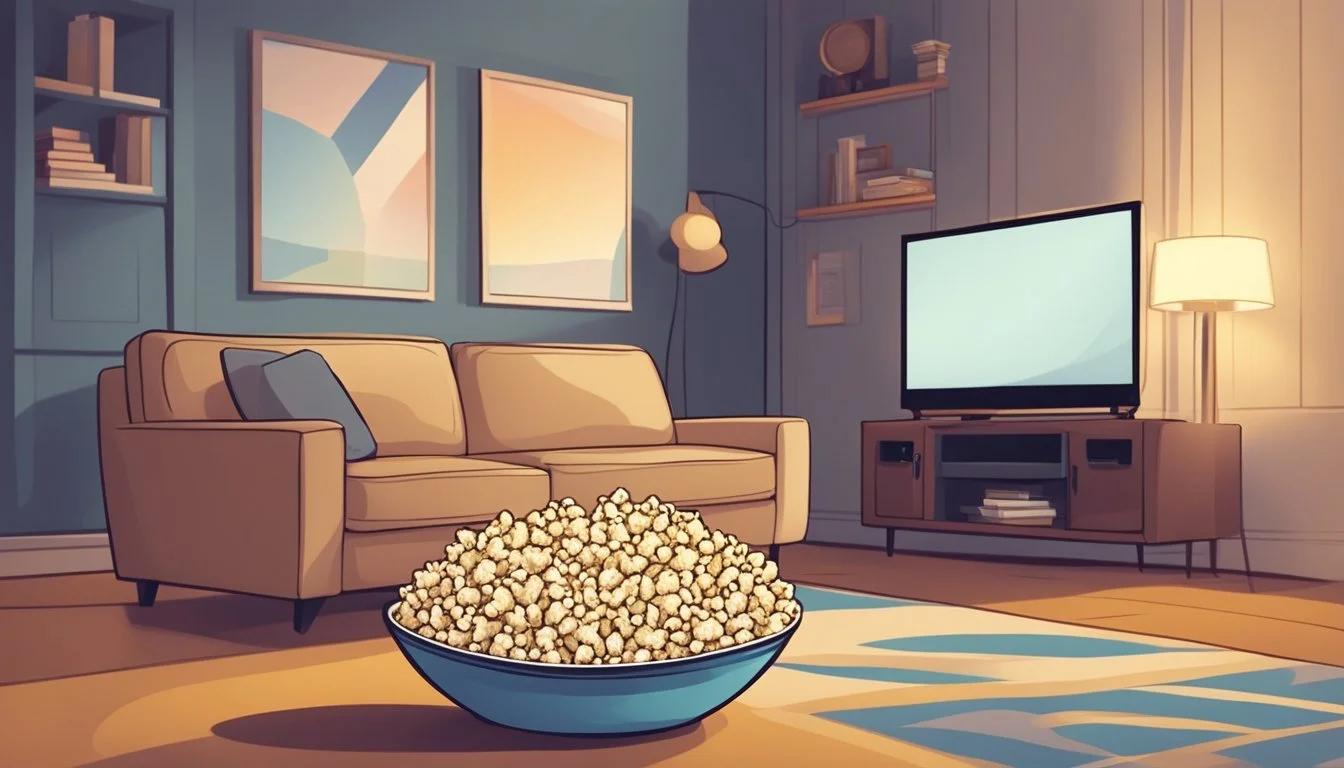How Long Does Popcorn Last?
Shelf Life and Storage Tips
Popcorn is a beloved snack enjoyed by many for its light texture and versatility in flavoring. The longevity of popcorn, both popped and unpopped, depends on the conditions under which it is stored. Unpopped popcorn kernels (how long does popcorn kernels last?) have a long shelf life when stored properly. They can remain usable for years, as the absence of moisture and air protects them from spoilage. A sealed bag of kernels may last indefinitely on your shelf, given that the environment is cool and dry.
Popped popcorn, on the other hand, has a shorter shelf life. It tends to absorb moisture, which can lead to staleness or mold if not stored correctly. In an airtight container, popped popcorn can maintain its quality for a brief period, typically a few weeks. Preservatives and packaging can extend the shelf life of commercially prepared popcorn products, such as microwave popcorn, which may last several months.
Storage is crucial for maintaining the quality of popcorn over time. An unopened, factory-sealed bag of popcorn kernels is less susceptible to environmental factors than an opened bag. Once opened, it's best to transfer the kernels to an air-tight container to prevent moisture from shortening their shelf life. Keeping popcorn in a cool, dry place away from sunlight and heat sources further ensures its longevity and readiness for movie nights to come.
Overview of Popcorn
Popcorn is a versatile and popular snack known for its myriad of varieties and health benefits when prepared in a nutritious manner. It can cater to a range of dietary preferences, from simple salted to gourmet flavors.
Popcorn Varieties
Popcorn comes in several forms, each offering a different experience for the consumer. The basic classification can be outlined as follows:
Whole Kernel: These are the dry, hard seeds that pop when heated. Whole kernel popcorn has numerous sub-varieties, including white and yellow, with slight differences in texture and popping volume.
Microwave Popcorn: Convenient and quick, this type comes in pre-packaged bags specifically designed for microwave use.
Ready-to-Eat: This type is pre-popped and often comes in various flavors, such as caramel, chocolate, or cheese.
Gourmet Popcorn: High-quality kernels or ready-to-eat popcorn that may feature unique and premium flavors.
Nutritional Value and Health Benefits
Popcorn, when air-popped and minimally seasoned, is a healthy snack:
High in Fiber: Popcorn contains a significant amount of dietary fiber, beneficial for digestion.
Whole Grain: As a whole grain, it contributes to a balanced diet and may help in weight management.
Low in Calories: Without heavy toppings, it’s a low-calorie option suitable for those monitoring their intake.
The nutritional content can vary greatly depending on the addition of flavors and toppings, as gourmet popcorn often includes additional sugars, fats, and sodium.
Shelf Life Fundamentals
Understanding the shelf life of popcorn is essential for both safety and quality. This includes recognizing the factors that affect longevity and knowing the typical duration popcorn remains edible.
What Determines Shelf Life
Shelf life is influenced by several factors that impact the preservation and freshness of popcorn. These factors include:
Storage Conditions: A cool, dry place extends shelf life by preventing moisture and heat that can lead to spoilage.
Packaging: Airtight, unopened packaging protects popcorn from contaminants and reduces exposure to air.
Exposure: Once opened or exposed to air, popcorn's shelf life is significantly reduced due to the risk of staleness and moisture intrusion.
Average Shelf Life of Popcorn
Popcorn's shelf life varies depending on its form and whether the packaging is opened or intact. Here is a breakdown of the average shelf life of popcorn:
Unpopped Popcorn:
Sealed, unopened: 6-12 months
Cool, dry place: Up to 2-3 years, although the chance of unpopped kernels increases with time.
Popped Popcorn:
Unopened: 2-4 weeks
Opened: 1-2 weeks
Properly resealed after opening can slightly extend this duration.
It is important to note that these are average durations and the actual shelf life can vary based on the specific product and storage circumstances.
Proper Storage Methods
Proper storage is essential for maximizing the shelf life of popcorn. It ensures that both unpopped and popped popcorn maintain their quality and freshness over time.
Storing Unpopped Popcorn
Unpopped popcorn kernels should be kept in an airtight container and placed in a cool, dry place, such as a pantry or kitchen cabinet, to prevent moisture and pest intrusion. Glass containers or vacuum-seal containers are ideal for this purpose as they can provide a moisture-free environment. Storing popcorn in its original unopened packaging is acceptable, but once opened, transferring to an airtight container is advisable. For prolonged storage, unopened bags of kernels may be kept in the freezer to extend their shelf life significantly.
Storing Popped Popcorn
Once popcorn has been popped, it's important to store it properly to maintain its texture and flavor. The best way to store popped popcorn is in an airtight container at room temperature. Using plastic wrap to cover the container before sealing can provide an additional barrier against moisture. Popped popcorn should not be stored in the fridge, as the humidity can lead to a loss of crunchiness. If the popcorn is flavored or contains added fats and oils, consume it within 1-2 weeks to ensure it doesn't become rancid.
Identifying Spoilage
When assessing popcorn for spoilage, it is crucial to recognize specific signs that indicate staleness or potential health risks associated with spoiled popcorn.
Signs of Stale Popcorn
Appearance: Fresh popcorn should be fluffy and crisp. If it appears shriveled or lacks its usual puffiness, it may be stale.
Taste: Stale popcorn often has a lackluster flavor, lacking the typical popcorn taste profile. It may become chewy rather than crunchy.
Smell: A fresh batch of popcorn has a distinct, appetizing aroma. An off or musty odor can signify that the popcorn is no longer fresh and has become stale.
Texture: The texture of popcorn that has gone stale will be notably tougher and not as enjoyable as when it was fresh.
Health Risks of Spoiled Popcorn
Mold Growth: Visible mold or a moldy smell indicates that popcorn should not be consumed due to potential mycotoxin production.
Rancidity: Popcorn that has a rancid smell may indicate that the fats in the popcorn have oxidized. Eating rancid popcorn can lead to digestive issues.
Food Poisoning: While eating expired popcorn isn't always harmful, if spoilage signs are evident, consuming it could result in food poisoning.
It's important to evaluate these factors before deciding to consume popcorn that may be past its prime.
Extending Popcorn's Lifespan
Preserving the crunch and flavor of popcorn hinges on minimizing exposure to moisture and ensuring appropriate storage conditions. This section outlines the best methods to maintain freshness and explores the viability of freezing as a preservation technique.
Best Practices for Freshness
Storage Conditions: To retain freshness and quality for both unpopped kernels and popped popcorn, it is crucial to store them in a cool, dry place away from direct sunlight. Excess moisture is popcorn's adversary, potentially leading to a loss of texture and even spoilage. Kernels should be kept in an airtight container to prevent moisture intrusion.
Temperature: Storage areas should be maintained at room temperature.
Containers: Use containers with tight-sealing lids.
Avoid Humidity: Keep popcorn away from areas with high humidity, such as the dishwasher or stove.
Effects of Freezing Popcorn
Freezing unpopped kernels is not commonly recommended as it can introduce moisture to the kernels when thawing, compromising their ability to pop. However, if one chooses to freeze popcorn:
Ensure kernels are completely dry before placing them in the freezer.
Use airtight containers or freezer bags to protect against freezer burn and moisture accumulation.
Popped popcorn generally does not respond well to freezing, as it can affect texture and freshness. The introduction of water crystals when freezing and subsequent thawing could lead to a softened texture, stripping away the desirable crunch. If frozen, consume promptly after thawing to enjoy the best possible quality.
Understanding Expiration Labels
When dealing with popcorn's shelf life, one must differentiate between several types of dates often printed on packaging. These indicators serve to inform consumers about the freshness and potential spoilage period of the product.
Expiration Date vs Best-Before Date
Expiration Date is the final date after which the product's quality is not guaranteed by the manufacturer. Consuming a product past this date could be risky as its safety cannot be assured.
Best-Before Date implies the date until which the product retains its optimal quality and flavor according to the producer's estimation. While it may lose some of its peak characteristics past this date, it generally remains safe to consume.
How to Read Packaging Dates
Consumers should look for two critical pieces of information on popcorn packaging to understand its potential longevity:
Production Date: This signifies when the popcorn was manufactured or packaged, offering insight into its age.
Expiration or Best-by Dates: These will be clearly labeled and should be read as follows:
Expiration Date: Strictly adhere to this date for health and safety.
Best-Before Date: Use sensory evaluation (smell, taste, texture) to judge popcorn quality beyond this date.
When reading these dates, one should also consider storage conditions, as they can drastically affect both flavor and safety.
Special Popcorn Types
Different popcorn varieties and flavorings can affect the shelf life. Understanding these specific types is critical for proper storage and optimal freshness.
Microwave and Ready-to-Eat Popcorn
Microwave Popcorn typically comes with a shelf life of 6-8 months when unopened. Once opened, the popcorn should be consumed within about a week to maintain its taste and texture. It's essential to keep the bag sealed after opening to prevent staleness.
Ready-to-Eat Popcorn, such as those that come in bags or tins, usually has a shorter shelf life due to the exposure to air and environmental factors. Unopened, these can last from 2-3 months, reducing to 1-2 weeks once the seal is broken.
Gourmet and Flavored Popcorn
Gourmet popcorn, which often includes flavored varieties such as caramel corn and cheese popcorn, typically have preservatives that extend their shelf life. However, once opened, these popcorn types should be consumed within:
Caramel Popcorn: 2-3 weeks to enjoy its optimal quality and prevent stickiness from exposure to humidity.
Cheese Popcorn: Best within 2 weeks to ensure the cheese flavor remains fresh and the popcorn doesn't become soggy.
The preservation of flavor is crucial, therefore, an airtight container is recommended for storing these popcorn types after opening.
Troubleshooting Common Issues
When managing popcorn longevity, consumers may encounter issues like unpopped kernels and potential infestations or contaminants. This section provides straightforward solutions to these common popcorn problems.
Dealing with Old Maids and Partially Popped Kernels
Old maids, or unpopped kernels, are often the result of insufficient moisture within the kernel or inconsistencies in heat during popping. To reduce the number of old maids, one should ensure that kernels are stored in an airtight container to retain moisture. Adding a small amount of water to the storage container and shaking it to distribute the moisture can sometimes revive stale kernels.
For partially popped kernels, adjusting the cooking time or temperature may be necessary. Microwave users should follow the manufacturer's directions and listen carefully, stopping the cooking process when the time between pops slows to avoid burning the less responsive kernels.
Preventing Infestations and Chemical Contamination
To prevent bugs and infestation in popcorn, storage is key. Popcorn should be kept in airtight containers and in a cool, dry place. Regularly cleaning the storage area also helps prevent infestations. In the case one notices bugs in the popcorn, it is important to discard the contaminated popcorn immediately to prevent the spread of the infestation.
Regarding chemical contamination, purchasing organic popcorn can reduce the risk of exposure to unwanted pesticides and herbicides. Always ensure popcorn is sourced from reliable suppliers, and check that packaging is intact to avoid accidental ingestion of chemicals. If the popcorn smells off or exhibits a strange aroma, it may suggest rancidity or chemical spoiling, and it is best to discard it.
Enjoying Popcorn Optimally
To ensure the best experience with popcorn, one should focus on the method of popping and the act of seasoning. These variables greatly influence flavor, texture, and the overall enjoyment, especially during social events like movie nights.
Best Practices for Popping
When popping popcorn, it is essential to use the right amount of oil—a tablespoon of oil per quarter cup of kernels is a good starting point. The oil should be heated on medium to high heat before adding the kernels, and once the kernels start popping, reduce the heat slightly to prevent burning. Here is a simple guide for popping batches of popcorn:
Heat the oil: Preheat your chosen oil in a large pot on medium-high until it's hot.
Test the kernels: Drop a couple of kernels into the oil; if they pop, the oil is ready.
Add popcorn: Pour in the rest of the popcorn kernels in an even layer.
Cover and shake: Cover the pot and give it a gentle shake to ensure the oil coats all the kernels.
Listen: Once the popping slows down, remove the pot from the heat to avoid burning the popcorn.
Seasoning and Toppings Tips
Once the popcorn is popped, immediately season it for the best flavor adherence. Salt is best applied while the popcorn is still hot, and for those seeking richness, melted butter can be drizzled over the top. For movie night enthusiasts seeking variety, experiment with a range of spices like chili powder or smoked paprika. (how long does smoked paprika last?) Additionally, sweet toppings such as melted chocolate can be a hit for a dessert-like treat. Here's how one can expertly season popcorn:
Salt: Toss the popcorn with salt to taste while it's fresh out of the pot.
Butter: Drizzle melted butter over the hot popcorn for a classic flavor.
Spices: Experiment with adding spices such as cayenne or garlic powder to the mix.
Chocolate: For a sweet twist, add a light drizzle of melted chocolate and let it harden.
Deploying these methods allows popcorn to be enjoyed at its peak, delivering the ultimate snack experience.
If you can’t find these ingredients in your local markets, you can order salt, butter, spices, and chocolate online!








